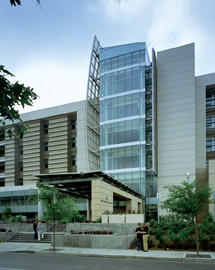
City of Hope Comprehensive Cancer Center
John D. Carpten, PhD, Director
Duarte, California
Main:
(626) 256-4673
Founded in 1913, City of Hope began focusing on cancer research and treatment in the late 1940s. Receiving its NCI designation in 1981 and its designation as a comprehensive cancer center in 1998, City of Hope is today a biomedical research, treatment, and education center.
The Center’s more than 200 physicians and scientists are dedicated to developing innovative, disease-fighting strategies in the battle against cancer. In this multidisciplinary, interactive environment, basic, clinical, translational, and prevention and control scientists work closely together. Their work is a continuum, starting with research on the biomedical mechanisms of cancer genesis and progression, moving on to the development of new therapies, testing those treatments in clinical trials, and, finally, delivering the best in patient care and providing support and education to patients, their families, and the public. That work contributes to further understanding of cancer risk assessment and prevention. Examples of the basic research findings developed at City of Hope are recombinant DNA technology and monoclonal antibodies and these discoveries were then applied to therapy.
City of Hope houses the National Medical Center, Beckman Research Institute, City of Hope Medical Foundation and the Irell & Manella Graduate School of Biological Sciences. Major facilities include City of Hope Helford Clinical Research Hospital and the Center for Biomedicine & Genetics, a manufacturing facility specializing in the production of pharmaceutical materials. Some of the cancers researched and treated at City of Hope include hematologic malignancies and solid tumors including breast, genitourinary/prostate, thoracic/lung, gastrointestinal/liver, musculoskeletal, gynecological, and brain cancers, as well as several pediatric cancers.
There are three major areas of research at the Center. The Cancer Biology program conducts basic laboratory research, contributing to understanding the underlying genetic, molecular, and biological bases of cancer. City of Hope’s clinical and translational research area consists of Developmental Cancer Therapeutics, Cancer Immunotherapeutics, and Hematologic Malignancies. These programs translate laboratory observations into patient treatments.
The third area encompasses the Center’s Cancer Control and Population Sciences program. It includes a broad spectrum of disciplines and is complemented by collaborations with physician investigators. This program focuses on four areas of concentration: host and environmental determinants of cancer; health-related outcomes and quality-of-life after cancer; interventional studies to reduce cancer-related morbidity; and educational initiatives.
Frequent interactions among investigators in the various City of Hope research programs result in shared insights. The research flow is circular, moving from prevention and basic discovery to treatment and providing insights back to basic and preventive research. These interrelated studies often link to Phase I and II clinical trials. They also are part of follow-up studies in survivorship and symptom management.
City of Hope collaborates with numerous other institutions through the National Comprehensive Cancer Network, the Blood and Marrow Transplant Clinical Trials Network, the Radiation Therapy Oncology Group, the Southwest Oncology Group, the Clinical Trials Consortium, the American College of Surgeons Oncology Group, and the Children’s Oncology Group.
* Information on this cancer center profile was provided by the City of Hope Comprehensive Cancer Center.